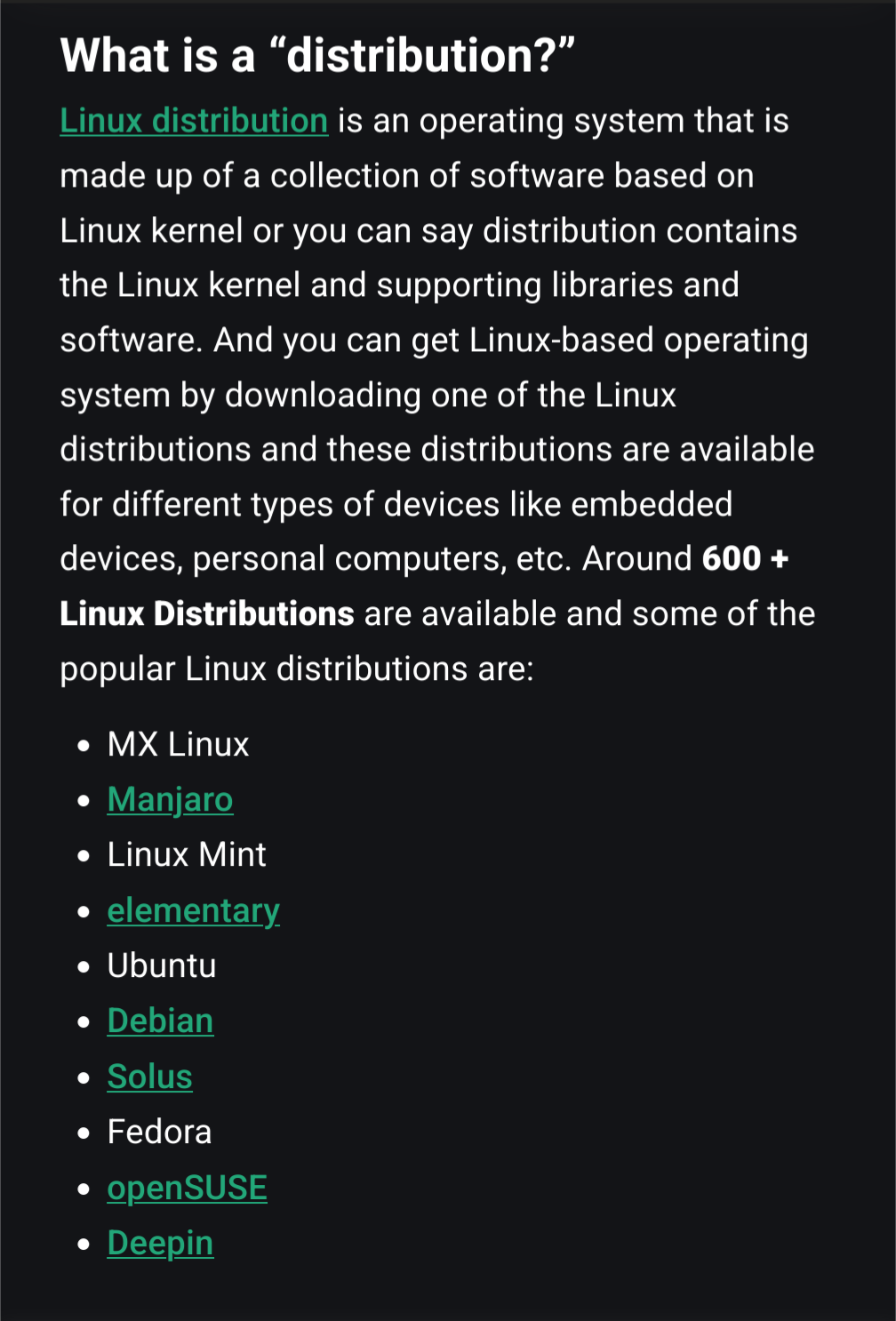Can someone point me to a helpful beginners resource explaining some Linux basics? Like what is the difference between “distro”, which is what, like Ubuntu, fedora, Debian (? Or is that a category of distro?) And desktop environment which is what, KDE, Lubuntu, gnome? Like I don’t even know I have these categories right let alone understand why I’d pick one over another and what practical effects it will have- which apps will I/won’t I be able to install, etc…
I’m not expecting anyone to answer these questions for me, but if you could point me to something already written, I’d appreciate it.
I think you have gotten a lot of good answers so my 2 cents are. Install something simple like Ubuntu and try it out. Getting the answers to your questions will not give you the “feel” of using a linux system. Once you start you will begin to have more answers and a lot more questions, specifically in the areas you are interested in.
Also check the Arch wiki, it is really good for any distro because it gives a good reference for configurations.
I have installed and used Ubuntu in the past. Now I’m exploring a project that uses a raspberry pi and I’m running into terms that I don’t know how to distinguish between.
This has some good info…
https://www.geeksforgeeks.org/introduction-to-linux-operating-system/
This article is conflating terms that I need help distinguishing between. The other commenter mentioned that Ubuntu is a type of Debian but this article lists Debian and Ubuntu as distributions.

See the comment here: https://sh.itjust.works/comment/14684312
This article is conflating terms that I need help distinguishing between. The other commenter mentioned that Ubuntu is a type of Debian but this article lists Debian and Ubuntu as distributions.
I’d say that the article is correct in calling them separate distributions.They are certainly related (both part of the Debian family), but I think most people would consider them to be separate distributions. Software built for Ubuntu 24.04 may work on Debian 12, but it might also not. For a beginner, I think it’s most useful to consider them to be separate things.
Each distro picks the things it likes the things it doesn’t like and it combines what it wants into a working operating system. Maybe they make some of their own custom stuff, maybe they just borrow other people’s stuff.
Debian, up until the last couple of revisions, was very big on choosing* only free things. If you wanted to use any non-free products you had to jump through small hoops. So Ubuntu took Debians core, and rewired it to properly support free things making installation and maintenance on newer hardware much easier. Because it was so much easier, they got a huge support community, and became the default for a lot of people just starting out. But then the guys that run Ubuntu also made other decisions, like trying to monetize some of the aspects or pushing for the use of different package managers that people don’t love. Mint came along and kind of filled the gap in between Ubuntu’s up sides and downsides and became the easy default for a lot of people. In the midst of all that turmoil, Debian slipped in their own version of making non-free software seamless. A lot of the support thrown into Ubuntu and Mint also helps Debian.
Red hat, fedora, and centos have the same kind of story going on, But it’s much less exciting and more about support and payments.
The next thing you hear about* is immutable operating systems. Like Fedora Silver Blue or NixOS*. They’re extremely secure, because you’re not allowed to make changes to the operating system blindly while it’s running, But it complicates just about everything you do in the name of security.
The other things you mentioned were window managers. (Gnome, KDE…) They’re basically affecting the look and feel of the GUI for the operating system. It’s your right click and your start menu and your window shades at the top and how windows are moved and snapped and organized. KDE looks and works by default a lot more like Windows, Gnome has a rather flexible plug-in system in tons of plugins available. Most of the other window managers are designed for low memory usage.
Another thing you’ll run into is X-Windows and Wayland. They mainly deal with backend internals of how the gui does its work. X Windows is ancient and compatible with just about anything that was ever made, Wayland is a bit flashier a little more efficient, and a little more secure, But at the same time it has a lot of compatibility issues with new hardware. Like if you’re going to run auto hotkey you’re going to have a harder time getting it to run under Wayland.
If you’re running on an x86/64 PC you can choose whatever you want, with the lion’s share of tech support being available for Debian variants (Debian, Ubuntu, Mint)
If you’re running on Mac, some distros are better supported.
If you’re running on a Raspberry pi you’re usually best going with one of the ones they recommend.
When someone says that an application is tested to work with a certain distribution, if most likely can work or be coerced to work with most of the other distributions, But the developer designed it under and tests it under whatever distribution they recommended regularly. So don’t be surprised if you choose something else and you have to fight with it a bit to get it to work or in rare cases it doesn’t work at all.
- edit: wording, typos and clarifications now that I’m not on mobile.
A distro is a complete installable operating system (+ a set of software repositories from which you can install updates and new software).
Many distributions (or their flavors/spins) will come with a default desktop environment and then usually also apply some distro-appropriate theming to that desktop environment.
If you look at screenshots of distributions, you’re likely just looking at screenshots of their themed default desktop environment.And a desktop environment is essentially the GUI of your OS.
It includes software such as the panel/taskbar, the application menu, the systray, the audio system, icons, a login screen etc… It also typically comes with a set of default applications, such as a file manager, a terminal emulator, a text editor etc…
In a sense, the desktop environment contains essentially everything that differentiates a desktop OS from a server OS (the latter is usually just a terminal, without graphical interface).basically there’s the big 3 (debian, arch, fedora) and everything else is just them with presets (ui, drivers, etc)
debian uses apt, arch uses pacman, fedora uses dnf for packaging, so packages (app executables) aren’t intercompatible and so you usually have some apps that aren’t available on on or the other
usually debian had everything, arch has everything with workarounds, idk about fedora
anyway the tree is like:
debian
- ubuntu
- kubuntu
- lubuntu
fedora
- nobara
arch
- manjaro
with DEs you should see which ones you like by testing them out, if you get the debian netinstaller you can select however many you want in the install process and you can switch between them at boot with the dropdown menu in the login prompt
Awesome. Thank you. So I understand why a debian package wouldn’t work on Fedora, but are there Kubuntu packages that wouldn’t work on Lubuntu? Otherwise is there “Kedora” and “Ludora”?
debian packages will work on debian based distros usually, etcetc
fedora calls their kedoras and ludoras “spins”, but I haven’t used fedora so can’t say how good they are
- ubuntu




